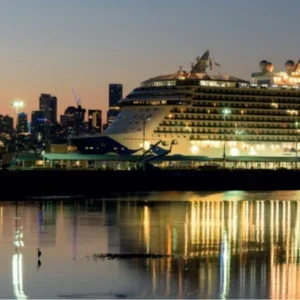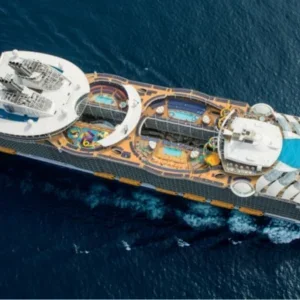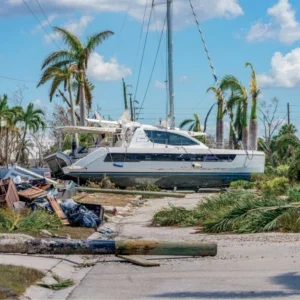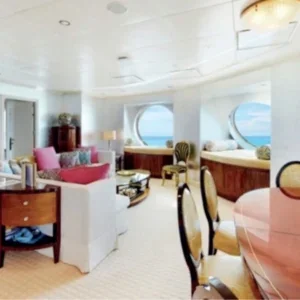Just trying to arrange an interview with Kit van Wagner gives you an insight into life in the expedition cruise industry. Speaking to World Cruise Industry Review one morning while on board Silversea’s Silver Discoverer, it was the first time in days that the expedition leader had phone reception to take a call. It was also the first time she’d had a minute to spare.
“People are headed off the ship,” she says, making coffee as 120 guests scatter in different directions at port in Juneau, Alaska. “Some are going for views of glaciers, others to a tram that rides up to the top of a nearby mountain. We also have a sea kayaking tour going out as well. All kinds of activities for different folks.”
Expedition explosion
With the expedition market booming, it’s unlikely that things will quieten down for Van Wagner and other adventure crews any time soon. In its ‘2017 Cruise Industry Outlook’ report, the Cruise Liner Industry Association says that “adventure travel is growing at a record pace”, listing it as one of eight key trends for the year. According to another paper, the ‘2017 Expedition Cruise Market Report’, 17 new expedition ships have been ordered for delivery between 2018 and 2021. Even traditional operators have been forced to become more creative in their offerings.
“I would say the expedition segment is booming across the cruise ship industry right now,” Van Wagner enthuses. “It is becoming a more popular way of travel. People love the smaller size of the vessels, the educational nature of the voyages and the fact that you have the flexibility to go to unusual destinations that are off the beaten track.”
However, as demands grows, so does the need to find expedition staff that can lead trips, give lectures and run workshops on board the ships.
In the past, Van Wagner says, recruitment was a case of learning on the job. “You learned because you took on successively more difficult itineraries and successively more difficult driving assignments,” she says. “You would challenge yourself and grow into the job.”
But this model is changing, as the market becomes more popular and more professional. “When we had a limited number of ships out there and a limited number of staff learning on the job, it was fine,” Van Wagner says. “But I think everybody is now finding that as we grow, and new ships are being built and added to the expedition cruise fleet, this is no longer realistic.”
Intense recruiting
To recruit and develop the crews that feature on every Silversea expedition voyage, Van Wagner has created a new leadership training academy.
“At the moment we have eight candidates on the programme, representing a whole range of different fields,” she says. “I’ve got a Fulbright scholar, someone with a PhD in zoology and people with several years of experience working in the field.”
The programme begins remotely, with the candidates developing skills through a series of webinar sessions. These focus on various aspects of working as a Silversea expedition guide, including life at sea, guest relations, boat handling and first aid. After that, candidates will be invited on board the Silver Cloud in the Antarctic to receive further intensive hands-on training. “They will attend lectures given by our existing lecture staff,” says Van Wagner. “I want them to have an ear for the content, but also to start building their own knowledge of the Antarctic, and developing how they will deliver and present lecture material.
“We will also start discussing different on-shore scenarios. If somebody twists an ankle on a hike, for example, what would we do? What are the correct protocols to get them back to the ship? We will review our operation manuals and also revise some of the fundamentals of boat handling. We will look at navigation skills using GPS, rules of the road, how ships cross, where the best anchorage site is in different situations, and so on.”
Increased exposure
The next step involves working on shore in a tiered system where candidates are given increased responsibility and exposure to new situations. “We will introduce our trainees to the world of guiding in a structured way,” says Van Wagner. “At first, they will just observe. I’ll send them out with long-standing, qualified guides to witness how it is done. They’ll see how our inflatable Zodiac boats are driven and how, for example, interpretation of a penguin colony is done. They’ll observe the types of questions asked of the guides and how they are answered.”
After this, the trainees will be allowed to start guiding trips themselves while under supervision. “They will go out again with an experienced guide and have the chance to actually participate. The knowledgeable guide will be offering back-up and doing the driving, allowing the new trainee to practise their interpretive skills.”
Finally, the trainees will be allowed out on their own. “Once they have had a chance to teach and get comfortable with that level of responsibility, I will have them guide by themselves,” Van Wagner says. “We will still have an experienced guide as back-up but the trainee will be fully responsible for organising the programme for the day. They will choose what to say and where to go.”
What sort of attributes is Van Wagner looking for from new expedition staff? Firstly, she says, a strong academic background. “They are expected to come with an in-depth knowledge in their field of study, preferably a Master’s or a PhD,” she says. “It can be in history, ornithology, botany, political science, anthropology, marine biology and so on. While on board, they will be giving two to five lecture presentations: that is our only form of entertainment on the voyage.”
The right stuff
But academic ability isn’t enough to make the cut as a Silversea expedition guide. “They also need to have the right interpersonal and interpretive skills,” Van Wagner adds. “We need people who are enthusiastic and passionate about their fields of study, and who love sharing that passion with our guests. We also need people who can work and function in a field setting, who have good orientation skills, who can drive a Zodiac and who can think quickly on their feet on a hike if the fog starts closing in around them.”
Speaking to Van Wagner, it’s clear just how different working on board an expedition ship is to your average gig in the cruise industry. Operating in such remote and challenging places means staff need to be more flexible and ‘freespirited’ than they otherwise might.
“If we decide to drop Zodiacs at six in the morning because we’ve had an incredible bear sighting on the shore, that’s the kind of experience we are going after,” says Van Wagner. “I doubt they are doing anything like that on a regular cruise ship. Last night, for example, we cruised past a whale feeding ground. We had orcas, humpback [whales], bears on shore, and salmon jumping out of the water. My team were all around the ship, pointing out the wildlife, answering people’s questions and keeping an eye out for more sightings.
“I also just found out from the pilot that the fjord we were hoping to visit has been thick with ice throughout the summer. Very few vessels have been able to get there, so rather than spending several hours attempting it we are going to make a completely different plan for tomorrow.”
Guest explorers
The guests on expedition ships are also different from normal cruise passengers. They expect some degree of luxury but are after more interesting things.
“These are folks that don’t want to spend all of their time on board in the casino,” says Van Wagner. “They are here primarily for the destinations and the experiences we can offer.”
The guests do have differing abilities, however, and staff need to be mindful of that. “We try to pitch our activities wherever possible to the interests and capabilities on board,” says Van Wagner. “If we land on a remote beach in the far east of Russia, and there is a peak that looks challenging and exciting, we will send staff and guests who want to go. But we will also offer a medium-length walk that might focus more on looking for wildflowers and birds, and a really short walk to a seal colony just down the beach.”
Finding staff with the right skills that can offer guests these kinds of experiences isn’t easy, Van Wagner admits. “It’s been a really rigorous search and it was a big investment of time,” she says of the current intake of recruits. “I think everyone across the industry realises that there are just not enough expedition staff to go around at the moment.”
In such a competitive talent landscape, Van Wagner hopes Silversea’s new training programme will help position the company as an employer of choice. “I think we are really leading the charge with this,” she says. “I’ve not heard of any other company that is looking for all of these different assets in their candidates and then building on those skills, and bringing them up to an expert level. We really are breaking new ground.”






